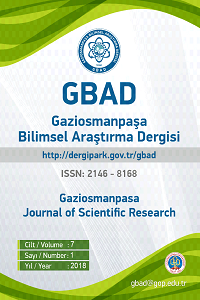Tarımsal Kobi’lerin Kırsal Kalkınmadaki Rolü (Tokat Merkez ve Niksar İlçeleri Örneği)
Bu araştırmada Tokat Merkez ve Niksar ilçelerindeki tarımsal KOBİ’lerin (Küçük ve Orta Büyüklükteki İşletmeler) kırsal kalkınmadaki rolleri belirlenmeye çalışılmıştır. KOBİ ve çiftçilerle anket yapılarak veriler oluşturulmuştur. Tarımsal ürün işleyen toplam 15 işletme ile görüşülmüş ve buna bağlı olarak seçilen 20 köyde salkım örnekleme yöntemiyle her köyden ikişer kişi seçilerek toplam 40 çiftçi ile anket yapılmıştır. Çiftçilerin sorunları, ekonomik ve sosyal durumları incelenmiş ve KOBİ’ler hakkında görüşleri ve iletişimleri ortaya konulmuştur. Ayrıca KOBİ’lerinde çiftçilerle olan iletişimi, kırsal kalkınma projesi altında hibe/ kredi alıp almadıkları, sorunları yöreye olan katkıları belirlenmiştir. Kırsal kalkınmanın sağlanmasında etkili olabilecek hibe ve kredilerin en fazla iş geliştirme ve makine alımında kullandıkları görülmüştür. İşletmelerin çiftçilerle hammadde alımı konusunda iletişimlerinin olduğu çiftçinin ürününün tarladan işletmeye ulaşmasıyla hem çiftçi hem de işletme sahibinin karlı olduğu ortaya çıkmıştır. Ancak Tarımsal KOBİ’lerin bölgede halen yetersiz sayıda olduğu ve bölgedeki KOBİ’lerinde bazı durumlarda hammadde ihtiyaçlarını farklı bölgelerden karşılamakta olduğu görülmektedir. Bu araştırmaya göre bölgedeki işletmelerin çiftçiyle daha yakın iletişimde olmaları, tarım sanayi entegrasyonun daha etkin sağlanması, bölgede tarım ve hayvancılığa gereken önemin verilmesi, çiftçilerin bilinç düzeylerinin artırılması için KOBİ’lerin eğitim çalışmaları yapması ve genç yaşta büyük şehirlere göçün engellenmesi gerekmektedir
Anahtar Kelimeler:
KOBİ, Kırsal Kalkınma, Kredi, Hibe.
The Role of Agrıcultural Small and Medıum Sızed Enterprıces In Rural Development (Case Study of Central and Niksar Dıstrıct of Tokat)
– This research aims to determine roles of Agricultural Small and Medium Sized Enterprises (Agro-SMEs) in rural development in Tokat and Niksar. Data were collected from Agro-SMEs and producers via survey. The researcher interviewed with fifteen enterprises that process agricultural products and according to these enterprises twenty villages are chosen and two villagers are chosen from these villages with the cluster sample model and our questionnaire is applied to forty villagers. This research determined problems, economic and social conditions of producers, producers’ point of views about Agro-SMEs and their communication. In addition, this research determined if the enterprises get financial support for rural development projects as credit or donation, communication issues between Agro-SMEs and producers, their problems and their contribution to this region. It is understood that credits and donations, that could be helpful for rural development are used for business development and purchase of machinery. Also, it is understood that enterprises have communication between producers about purchase of raw materials and as a result of direct transportation of raw materials from producers field to the factory is beneficial for both producers and enterprises. However, it is understood that Agro-SMEs are still insufficient in numbers and sometimes this region’s Agro-SMEs provide their raw materials from some other regions. According to this research, enterprises in this region should improve their communication with the villagers, they should ensure more effective integration of agriculture and industry, necessity of animal husbandry should be considered, Agro-SMEs should do educational works to improve level of producers’ consciousness and migration of young people to big cities should be prevented.
Keywords:
Agro-SMEs , Rural Development, Credit , Grant,
- ISSN: 2146-8168
- Yayın Aralığı: Yılda 3 Sayı
- Başlangıç: 2012
- Yayıncı: Tokat Gaziosmanpaşa Üniversitesi
Sayıdaki Diğer Makaleler
Tarımsal Kobi’lerin Kırsal Kalkınmadaki Rolü (Tokat Merkez ve Niksar İlçeleri Örneği)
Tarihi Niksar Kırk Kızlar Türbesinin Sismik Davranışı
Esnek Gruplar Üzerinde Bazı Cebirsel Uygulamalar
Tavuk Dışkısının Çevre Sorunu Olmaktan Çıkarılmasında Uygulanan Yöntemler
Hasan ELEROĞLU, Sayiter YILDIZ, Arda YILDIRIM
